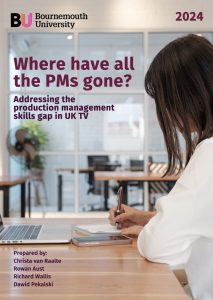 New research into production management in the UK’s TV industry has found that there is a corrosive cultural divide between ‘production’ and ‘editorial’. This distinction between those involved in the ‘creative’ aspects of making tv and those who manage its more logistical aspects is what lies at the heart of much of the discontent experienced by today’s production managers, the research has found.
New research into production management in the UK’s TV industry has found that there is a corrosive cultural divide between ‘production’ and ‘editorial’. This distinction between those involved in the ‘creative’ aspects of making tv and those who manage its more logistical aspects is what lies at the heart of much of the discontent experienced by today’s production managers, the research has found.
‘We have known for a long time that production managers lack visibility and feel undervalued’, explains Dr Christa van Raalte, who led the project. ‘When three-quarters of respondents told us last year that they were seriously considering leaving we knew the problem was deeply rooted. The aim of this latest research has been to gain a much clearer understanding of what it is that attracts people into production management roles in the first place and what we could do better to keep them. What’s the point of investing in the recruitment of new production talent if we can’t hang on to the ones we’ve got?’
The new report launched this week, Where have all the PMs gone? Addressing the production management skills gap in UK TV, builds on an earlier survey with in-depth interviews. The result is a detailed and nuanced account of the experience of working in production management. The report makes eleven recommendations for change, from clearer job definitions and more equitable pay rates, to improved training and development.
The report concludes that there is much to be done to ensure that production management is properly recognised and understood both in and beyond the industry, that PMs are treated equitably and respectfully, and that employers are able to recruit and retain the workforce they need. This cannot be achieved without addressing ingrained working culture and practices. The challenge this represents for the wider industry, claims the report, should not be underestimated.
The project’s research team is based at the University’s Centre for Excellence in Media Practice (CEMP) and funded by the British Academy and Leverhulme Trust.
The full report and a shorter summary are available at https://eprints.bournemouth.ac.uk/39530/











 From Sustainable Research to Sustainable Research Lives: Reflections from the SPROUT Network Event
From Sustainable Research to Sustainable Research Lives: Reflections from the SPROUT Network Event REF Code of Practice consultation is open!
REF Code of Practice consultation is open! BU Leads AI-Driven Work Package in EU Horizon SUSHEAS Project
BU Leads AI-Driven Work Package in EU Horizon SUSHEAS Project ECR Funding Open Call: Research Culture & Community Grant – Apply now
ECR Funding Open Call: Research Culture & Community Grant – Apply now ECR Funding Open Call: Research Culture & Community Grant – Application Deadline Friday 12 December
ECR Funding Open Call: Research Culture & Community Grant – Application Deadline Friday 12 December MSCA Postdoctoral Fellowships 2025 Call
MSCA Postdoctoral Fellowships 2025 Call ERC Advanced Grant 2025 Webinar
ERC Advanced Grant 2025 Webinar Update on UKRO services
Update on UKRO services European research project exploring use of ‘virtual twins’ to better manage metabolic associated fatty liver disease
European research project exploring use of ‘virtual twins’ to better manage metabolic associated fatty liver disease